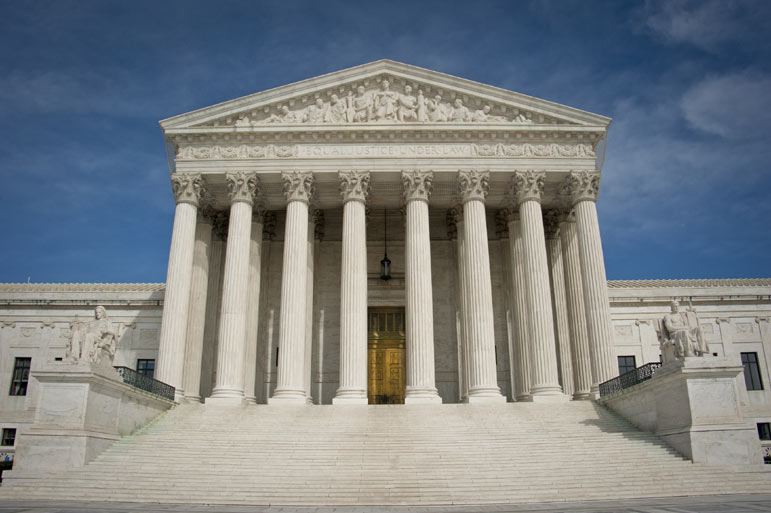
The case would have been a sequel to last year's consideration of the same topic. The court ruled then for a Colorado baker who refused to make a cake for a gay couple's wedding reception, but it left undecided whether a business owner's religious beliefs or free speech rights can justify refusing some services to gay people.
The Supreme Court deliberated for months about whether to take the Oregon case. The delay indicates there were behind-the-scenes negotiations, though the justices did not reveal them. Instead, they simply sent the matter back to an Oregon appeals court and told it to look again in light of the Colorado decision.
It is one of several cases around the country in which bakers, florists, photographers, calligraphers and others have said they don't want to participate in same-sex nuptials because of religious convictions. So far, courts have largely sided with the plaintiffs, saying businesses that serve the public must offer their services to all.
In the Oregon case, Melissa and Aaron Klein closed their bakery in a Portland suburb, Sweet Cakes by Melissa, after being fined $135,000 for refusing to make a wedding cake in 2013 for a lesbian couple.
Last term, Justice Anthony Kennedy found improper religious bias by some Colorado officials against baker Jack C. Phillips. But he acknowledged the decision did not settle the larger issue.
Future courts would need to balance the rights of those with religious objections to same-sex marriage along with the rights of gay people, who "cannot be treated as social outcasts or as inferior in dignity and worth," Kennedy wrote for the court majority.
Those cases "must be resolved with tolerance, without undue disrespect to sincere religious beliefs, and without subjecting gay persons to indignities when they seek goods and services in an open market."
The case involving the Kleins was decided by an Oregon court before the Supreme Court's decision last June in Masterpiece Cakeshop v. Colorado Civil Rights Commission.
The Kleins framed their case as "whether artists in public commerce are protected by the First Amendment when they decline to create expression that would violate their religious beliefs."
After seeing one of the Kleins' cakes at a wedding exposition, Rachel Bowman-Cryer and her mother, Cheryl, visited Sweet Cakes to order one for Rachel's upcoming marriage.
When Aaron Klein asked the name of the bride and groom, he was told there would be two brides. Klein said the bakery did not make cakes for same-sex ceremonies because the Kleins believe that a marriage is limited to the union between a man and a woman.
The women left, but Cheryl returned to tell Aaron Klein she once shared his views but believed the Bible was silent on the issue. Aaron Klein quoted a verse from the Book of Leviticus: "You shall not lie with a male as one lies with a female; it is an abomination."
Rachel and Laurel Bowman-Cryer filed a complaint with a state administrative agency, arguing that the Kleins' refusal violated Oregon's anti-discrimination law, which covers sexual orientation.
The agency agreed the Kleins had violated the public accommodation law and awarded the Bowman-Cryers $135,000. A state appeals court upheld that ruling and rejected the bakers' argument that it violates the First Amendment to compel them to "express a message - a celebration of same-sex marriage - with which they disagree."
The Oregon Supreme Court declined to review the decision.
The Kleins' petition notes that in finding for the right to same-sex marriage in Obergefell v. Hodges, the court acknowledged it might strain religious freedom. The decision, it argued, "inevitably requires this court to decide whether that newly recognized marriage right can be wielded not only as a shield in defense of same-sex unions but also - as in this case - a sword to attack others for adhering to traditional religious beliefs about marriage."
Oregon says the state Bureau of Labor and Industries did nothing more than enforce a "neutral and generally applicable law that requires business owners to provide equal services to all customers without regard to protected status, including race, gender, religion, or sexual orientation."
A similar case, involving a florist in Washington state who refused to provide flowers for a same-sex ceremony there, is on its way to the high court. The Washington Supreme Court had previously ruled against the florist, reviewed the case in light of the Masterpiece decision, and recently reaffirmed its unanimous decision.
The case is Klein v. Oregon Bureau of Labor and Industries.
Sign up for the daily JWR update. It's free. Just click here.
(COMMENT, BELOW)


 Contact The Editor
Contact The Editor
 Articles By This Author
Articles By This Author